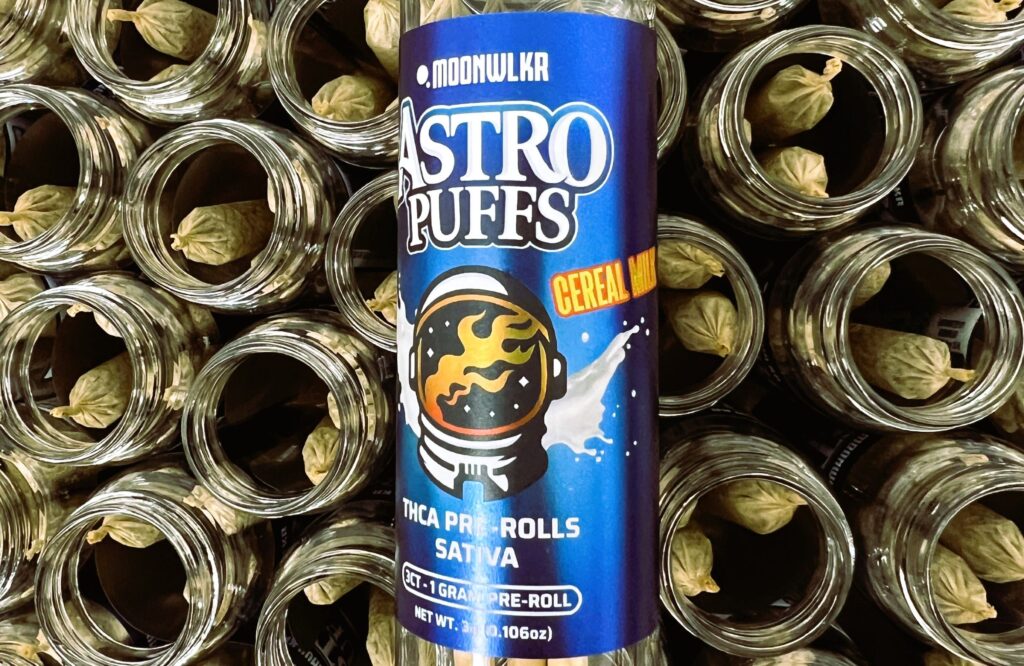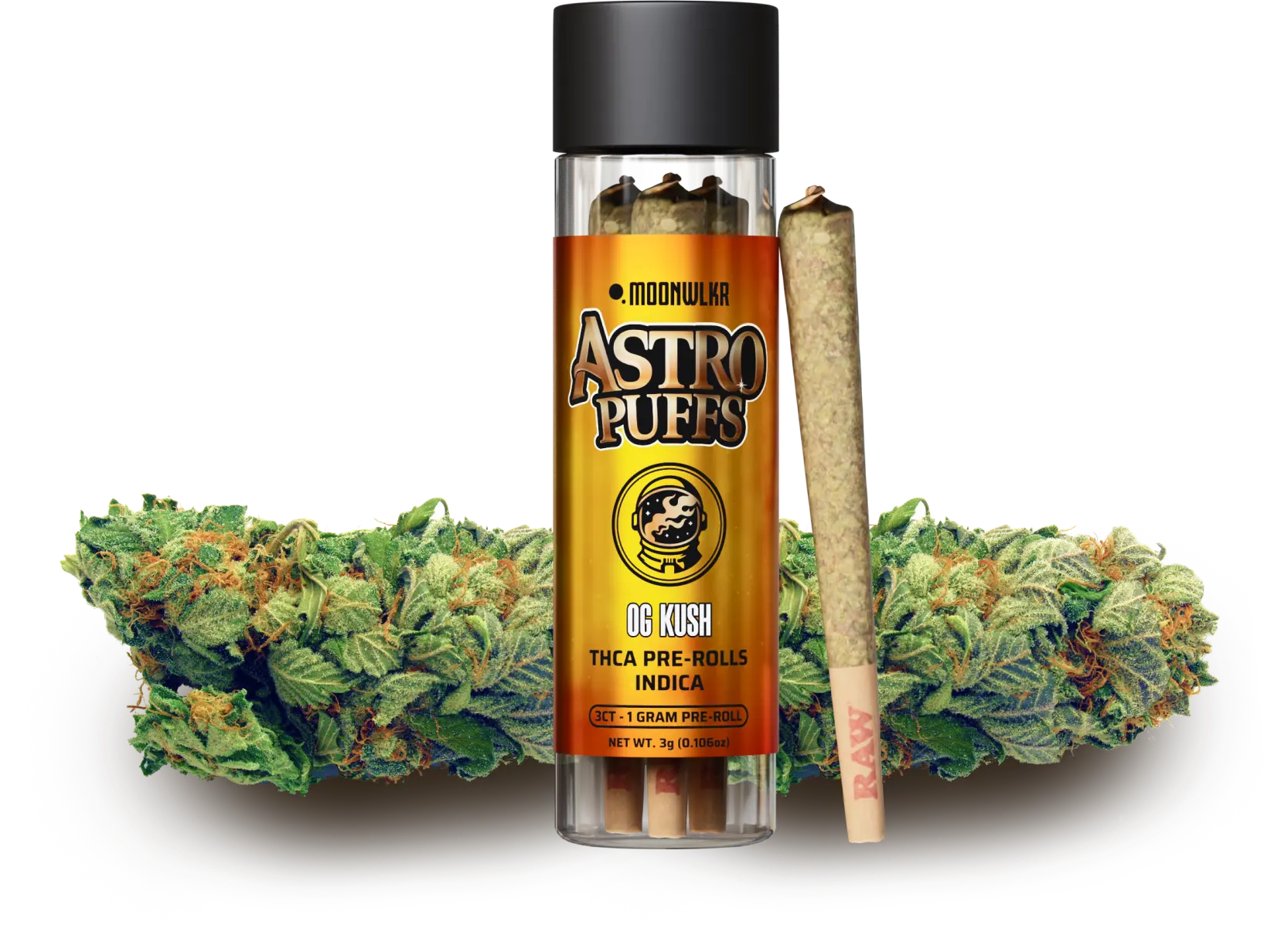So, you’re thinking of trying THCA, but you’re wondering: Is it safe?
There are a number of factors that will determine whether THCA is safe. These include the quality and sourcing of the THCA flower, industry regulations limiting requirements for safety testing, and your unique health situation.
The good news? THCA is generally considered to be very safe for most people. And if you’re already an active cannabis user (we’re talking about THC, Delta 9, Delta 8, etc) then THCA will fit right into your cannabis routine.
If you’re a new THCA user, this guide will help you understand the potential safety implications and what to look for when buying a THCA product.
Let’s get started with a quick overview of the basics:
What is THCA?
THCA, or tetrahydrocannabinolic acid, is a non-psychoactive cannabinoid precursor found in raw and live cannabis plants. Unlike its well-known counterpart, Delta 9 THC, which is psychoactive and responsible for the euphoric “high” associated with cannabis use, THCA offers potential therapeutic benefits without inducing intoxication.
THCA is gaining interest for its health-promoting properties, including anti-inflammatory and neuroprotective effects. Legally distinct, THCA is technically federally legal under the 2018 Farm Bill when derived from hemp, highlighting its emerging role in the wellness and medical research fields without the legal complexities of THC.
Still curious about THCA? Check out our in-depth analysis of THCA vs Delta-9 THC.
THCA legal status & safety
When it comes to safety and legality, THCA is a bit unique. That’s why so many industry folks are abuzz with news and commentary on this unique cannabinoid.
THCA is the precursor to Delta 9 THC. But unlike Delta 9, which faces strict regulations and is federally illegal, THCA is in a bit of a gray area.
As long as THCA is derived from hemp—cannabis containing less than 0.3% THC by dry weight—it is considered federally legal under the 2018 Farm Bill. This legislation notably removed hemp from the Controlled Substances Act, distinguishing it from marijuana and opening doors for hemp-derived cannabinoids, including THCA.
But here’s the catch.
When you heat THCA, or smoke it, a very complex scientific process happens called decarboxylation. This process causes the THCA to lose its acid group – the “A” in “THCA” – and it therefore becomes the psychoactive version of itself.
So you can see the appeal.
Something which is not psychoactive when it’s sold on the shelf becomes psychoactive through the mechanisms of heating it with sunlight, smoke, or cooking.
This process isn’t unsafe, and it all happens in seconds without you knowing it. But for those looking for a non-psychoactive compound, it’s imperative to remember that THCA becomes THC when smoked.
State laws and THCA access
Remember: while THCA is technically federal legality under the Farm Bill, your state laws may vary. Some states have specific regulations regarding hemp and hemp-derived products, which could impact the availability and legal status of THCA products. Your best bet regarding legality is to check in with your local regulations on a regular basis.
Learn more about all things legal THCA here!

What are the potential risks of THCA?
Our stance here at Moonwlkr is rooted in curiosity and caution. We champion the promise that THCA holds, especially for those seeking the therapeutic whispers of THCA.
Yet, we are also steadfast advocates for informed exploration. The cannabis landscape is ever-evolving, and as it does, so too should our understanding of the cannabinoids it harbors.
So with that in mind, let’s talk about some of the potential risks of THCA and THC. For the purpose of this section, we’re going to assume you’re smoking or heating THCA so that it becomes THC.
1. Users should consider the psychoactive effects
THC is known for its psychoactive properties, which can affect mental processes, mood, and perception. Users should be aware of the potential for altered states of consciousness.
Some folks may experience anxiety, paranoia, or discomfort when consuming THCA or THC, particularly at higher doses or when you aren’t an experienced cannabis explorer.
But don’t worry! You can help ensure you have a relaxing first experience with THCA by not consuming alcohol, trying it in a relaxed setting, finding a friend to help guide you, and starting off really slow.
2. THCA may cause coordination impairment
THC can impair motor coordination, reaction time, and cognitive functions, making tasks such as driving or operating machinery dangerous. Especially if you’re overindulging a bit.
That poses specific safety concerns for folks who have plans. Never smoke THCA and drive and always make sure you have plenty of time to enjoy your psychoactive experience in a safe space.
3. Potential legal implications
The legal status of THCA and THC will vary significantly by jurisdiction. Just be aware of your local regulations before you try THCA.
4. A small risk of dependency
Though not as physically addictive as some substances, regular, heavy use of THC can lead to dependency and withdrawal symptoms such as irritability, mood swings, and sleep disturbances. This is a risk with any psychoactive substance. Here at Moonwlkr, we strongly suggest moderation and thoughtfulness when it comes to using any cannabinoid.
We feel it’s also important to note that highly-regular use of THC can lead to increased tolerance. What does that mean, exactly? Well, steady doses over time may mean that your body requires even higher doses to achieve the same effects, which could increase the risk of negative side effects.
5. Potential interactions with medications
THC can interact with various medications, altering their effectiveness or leading to adverse effects. That’s why it’s a good idea to be honest with your doctor about any THC use, including THCA.
We want to encourage any individual with a history of mental health disorders, pregnant women, and those with a predisposition to heart conditions to use caution when exploring any THC product.
6. A lack of regulation leading to quality and purity concerns
The unregulated market can lead to variations in product quality and purity. Just because a brand has a beautiful product, doesn’t mean they’ve done their due diligence on quality, safety, and third-party testing! A lack of quality control could potentially expose you to harmful contaminants. Opting for lab-tested products is advisable.
Here at Moonwlkr, we work with independent labs to test every single product we produce and we make those results readily available on our site here.
Have more questions about THCA and safety? Check out these FAQs from our happy customers.

THCA Safety FAQs
Can consuming THCA lead to failing a drug test?
It sure can! But it depends on how you consume it. THCA is non-psychoactive and does not convert to THC unless decarboxylated (that means heated). Consuming THCA in its raw form is unlikely to result in a positive drug test for THC.
However, if you smoke THCA, expose it to a lot of sunlight, leave it in a very hot car, or use it in cooking, you’re likely to see a positive THC result on your drug test.
Basically: heating THCA causes it to become THC. (It’s science!)
Read more about THCA and drug testing here! You can also check out more information about the longevity of THCA in your system here!
Is there anyone who should avoid using THCA?
THCA research is limited, but those who frequent other THC variations are likely to have similar effects. However, some folks should consider avoiding any THC use. These might include individuals with specific health conditions or those taking certain medications. Please always consult with a healthcare provider before using THCA. While THCA is generally considered safe, personal health circumstances cause potential interactions, risks, or unwanted side effects.
Can THCA interact with medications?
While THCA is not known to have significant interactions with most medications, the full extent of its interactions is not entirely understood. Research is pretty limited on THCA for the moment. We highly recommend you consult your pharmacist and healthcare professional if you’re taking medications and using any THC product.
How can consumers use THCA safely?
To use THCA safely, start with low doses to gauge individual tolerance and avoid converting THCA to THC unless desired. Purchasing from reputable brands that provide product transparency and lab testing results is also crucial for safety.
What should consumers look for to ensure the safety of THCA products?
Consumers should look for products from reputable sources that provide third-party lab testing results. Like we do here at Moonwlkr. These results can verify the product’s THCA content and ensure it is free from harmful contaminants.
What are the side effects of THCA?
When consuming THC, individuals might experience a range of side effects, including dry mouth, red eyes, increased heart rate, coordination problems, delayed reaction times, memory loss, anxiety, paranoia, and in some cases, dizziness.
These effects can vary widely among users, depending on factors such as the dose, the method of consumption, and individual sensitivity to THC.
It’s important for users to be aware of these potential side effects and to consume THCA responsibly, especially if you are new to cannabis products or have underlying health conditions.
New to THCA? No worries! Delve into our new user guide here!





